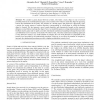Free Online Productivity Tools
i2Speak
i2Symbol
i2OCR
iTex2Img
iWeb2Print
iWeb2Shot
i2Type
iPdf2Split
iPdf2Merge
i2Bopomofo
i2Arabic
i2Style
i2Image
i2PDF
iLatex2Rtf
Sci2ools
102
click to vote
CORR
2011
Springer
2011
Springer
Hide-and-Seek with Directional Sensing
: We consider a game played between a hider, who hides a static object in one of several possible positions in a bounded planar region, and a searcher who wishes to reach the object by querying sensors also distributed in the plane. The searcher is a mobile agent, and whenever it physically visits a sensor, the sensor returns a random direction, corresponding to a half-plane in which the hidden object is located. We first present a novel search heuristic and characterize bounds on the expected distance covered before reaching the object. Next, we model this game as a large-dimensional zero-sum feedback matrix game and we apply a recently introduced randomized sampling technique that provides a probabilistic level of security to the hider. We observe that, when the randomized sampling approach is only allowed to select a very small number of samples, the cost of the heuristic is comparable to the security level provided by the randomized procedure. However, as we allow the number of sa...
Related Content
| Added | 13 May 2011 |
| Updated | 13 May 2011 |
| Type | Journal |
| Year | 2011 |
| Where | CORR |
| Authors | Alessandro Borri, Shaunak Dattaprasad Bopardikar, João Pedro Hespanha, Maria Domenica Di Benedetto |
Comments (0)

